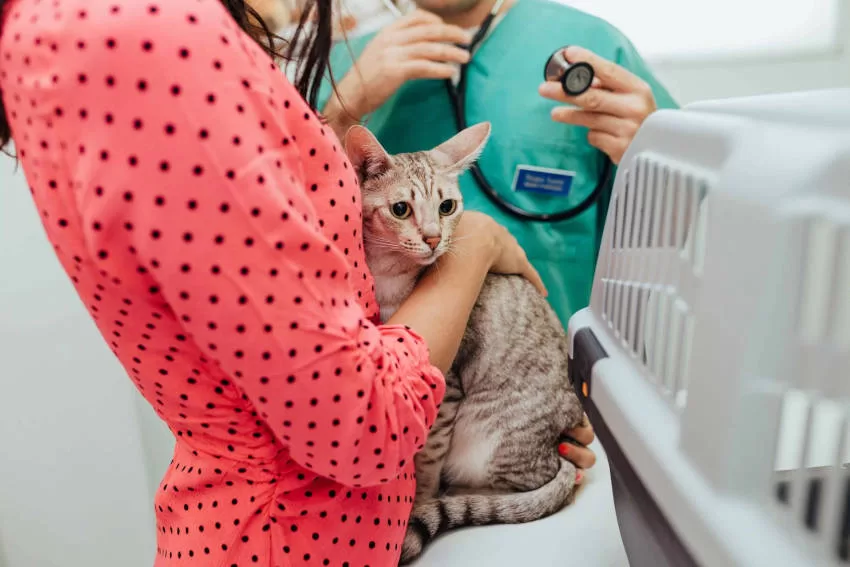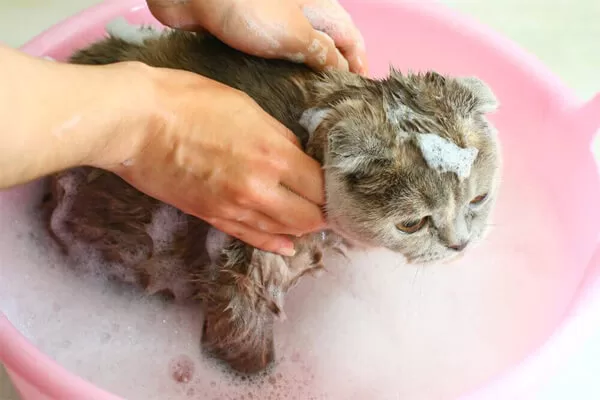Introduction to “Cat Deworming”
Did you know that your cat’s health could be at risk from parasites? Yes it is true! Deworming is crucial for our pet’s overall well-being. Antiparasitics, such as pipettes and collars, help fight invisible enemies that may be hiding in your pet’s fur or inside your pet’s digestive system.
There are several types of common parasites that cats can infest, including fleas and other more sinister critters. Deworming your cat regularly not only prevents health problems, but also ensures that your cat stays happy and healthy. So the next time you’re thinking about your cat’s health, don’t forget that important antiparasitic tablet!
Identifying Parasites in Kittens
Common Physical Signs
Parasites, unfortunately, are a common reality in the lives of many cats. It is essential to know the physical signs that may indicate the presence of these parasites. Some common symptoms include:
- Weight loss
- Diarrhea or constipation
- Vomiting
- Coat dull and rough
- Bloated belly (common in puppies)
These symptoms may vary depending on the type of parasite the cat has.
Abnormal Behaviors
In addition to physical signs, there are abnormal behaviors that can indicate the presence of parasites in kittens. If your cat is more lethargic than usual, crawling around on the floor or grooming itself excessively, this could be a sign of a parasite infestation.
Another strange behavior is a sudden change in appetite – either an increase or a decrease. The important thing is to be aware of any changes in your cat’s usual behavior.
Regular Veterinary Consultations
The best way to identify the presence of parasites in cats early is through regular veterinary appointments. Preventive exams allow you to detect parasites even before the first symptoms appear.
The veterinarian will perform a complete physical exam and may order additional tests such as fecal tests to check for parasite eggs or larvae.
Remember: the earlier the parasites are detected, the easier the treatment will be and the less discomfort will be for your furry friend.

Resuming:
- Keep a close eye on your cat’s behavior and physical appearance.
- Do not ignore any strange signs.
- Take your cat to the veterinarian regularly for preventative check-ups.
The health of our feline friend is in our hands!
Deworming Kittens: Frequency and Methods
Ideal Frequency
Deworming kittens is a crucial aspect of their health. The ideal frequency for deworming depends on several factors, including the age of the cat, its lifestyle and the prevalence of parasites in the area where it lives. However, veterinarians generally recommend that:
- Kittens are dewormed for the first time between 2-6 weeks of age.
- Continue to be dewormed every two weeks until they are three months old.
- After three months, they should be dewormed monthly until they reach six months.
From the age of six months, an adult cat should be dewormed at least twice a year. However, if your cat spends a lot of time outdoors or is in contact with other animals that may have parasites, it may be necessary to increase the frequency.
Available Methods
There are several effective methods to deworm cats:
- Oral pills: are one of the most common and effective ways to treat internal parasites.
- Topical Spot-on: These are applied directly to the cat’s skin and can treat both internal and external parasites.
- Injections: These are administered by a veterinarian and are mainly used to treat severe infestations.
Choice of Method
When choosing a deworming method for your cat, there are several important considerations:
- Cat age: some methods are not suitable for very young kittens.
- General Cat Health: Some medications may not be suitable for cats with specific health conditions.
- Personal Preferences: If you have difficulty giving your cat pills, you may prefer a topical method or an injection.
Always remember that the best way to ensure effective deworming is to consult a veterinary professional before starting any treatment. They will be able to provide personalized advice based on your pet’s specific needs.
Symptoms of Roundworms in Cats
Cats are incredibly resilient animals, but that doesn’t make them immune to roundworms. These intestinal parasites can cause a series of unpleasant symptoms in our feline friends.
Common Symptoms
The most common symptoms associated with roundworm infestation in cats include:
- vomiting
- Diarrhea
- Weight loss
- Swollen and hard belly
- Dull or rough coat
- Lack of appetite
These signs are very clear and if your cat has any of these symptoms, you should take him to the vet as soon as possible.
Effects on Digestive Health
Roundworms affect cats’ digestive health in several ways. First, they feed on the nutrients the cat ingests, leaving it malnourished. In addition, roundworms can block the animal’s intestines, causing vomiting or diarrhea. In severe cases, this can lead to a condition called intestinal impaction which can be fatal.
Rapid Intervention is Essential
When this condition is suspected, it is important to act quickly. Roundworms have a quick life cycle and can easily multiply in your cat’s digestive system. The sooner treatment begins to eliminate these undesirable pests, the better it will be for your pet’s health.
Regular deworming is also crucial to preventing future roundworm infestations. This practice not only protects your cat from the diseases that these parasites can transmit, but also prevents them from spreading their larvae around the environment where they live.
In conclusion, keeping an eye out for roundworm symptoms in cats and intervening quickly when necessary could save your feline friend’s life. Regular deworming is also a vital step in keeping your pet healthy and free of these unwanted parasites.

Internal and External Deworming: Treatment Options
Comparison between internal and external treatments
Deworming cats can be done both internally and externally. The internal treatment treats infestations by parasites that live inside the animal’s body, such as roundworms and tapeworms, while the external treatment solves problems with fleas, ticks and mites.
Advantages of internal treatments:
- Effective against a wide variety of intestinal parasites.
- It can be administered at home with oral medications.
Disadvantages of internal treatments:
- Some cats may have difficulty swallowing pills or refusing food laced with medication.
- It requires careful monitoring to ensure that the medicine has been fully consumed.
Advantages of external treatments:
- Easy application on the cat’s skin.
- Effective in preventing flea and tick reinfestation.
Disadvantages of external treatments:
- Some products can cause skin irritation.
- Cats can lick the application area, ingesting part of the product.
Factors that influence the choice of the appropriate type of treatment
Choosing between an internal or external method depends on your cat’s specific needs. Consider the following factors:
- Type of parasite: If your cat has intestinal worms, an internal treatment is necessary. For flea or tick infestations, opt for an external method.
- Age and health status: Young kittens or older cats may need smaller doses or different types of medication.
- Lifestyle: Outdoor cats are more exposed to parasites and may need extra protection from reinfestation.
Effectiveness of Preventive Treatments
Preventative methods play a crucial role in maintaining your cat’s health. Preventive products are effective in preventing both internal and external reinfestations. However, they must be used regularly to ensure continued protection.
Always remember that the best way to treat any problem is to prevent it before it happens. So check with your veterinarian regularly to check your feline friend for any early signs of parasite infestation!

Prevention of Parasites in Cats: Importance
Consequences of Negligence
It is important that we understand the potential consequences of neglecting parasite prevention in cats. Felines can be infested with a variety of parasites, including fleas, ticks, mites and intestinal worms. These can cause a range of health problems in cats, such as weight loss, anemia and serious parasite-borne illnesses.
Simple Preventive Measures
There are simple but effective preventive measures to control feline parasites. Prevention can include:
- Keep the environment clean: This includes the house, the cat’s bed and any other place where the cat can spend time.
- Regular Treatments: There are several products available that can be applied regularly to prevent parasite infestations.
- Proper diet: A balanced diet strengthens the cat’s immune system and helps prevent parasitic infections.
Regular Visits to the Veterinarian
Prevention against parasites also involves regular visits to the veterinarian. The professional can perform periodic examinations to check for signs of parasite infestation and provide appropriate preventive treatments.
Veterinarians play a crucial role in keeping our pets healthy. They are able to identify the signs of a possible parasite infestation early and start treatment before the problem becomes serious.
In summary, it is crucial to understand the importance of preventing parasites in our feline friends. With simple but effective measures and regular vet visits, we can ensure that our cats remain healthy and free of these unwanted intruders.

Risks of Not Deworming in Cats
Serious Health Problems
Failure to regularly deworm cats can lead to serious health problems. Internal parasites such as worms and protozoa can cause diarrhea, vomiting, weight loss and anemia. Already external parasites, such as fleas and ticks, can cause intense itching, skin wounds and even transmit serious diseases.
For example:
- Heartworm disease (caused by a type of worm) can affect the animal’s heart.
- Fleas can transmit bartonellosis or “cat scratch disease”, which causes fever and skin lesions.
Impact on Quality of Life
Your feline’s well-being is also seriously affected by parasite infestation. The constant itchiness caused by fleas can make your cat stressed and uncomfortable. In addition, symptoms of internal parasites – such as abdominal pain and weakness – decrease the cat’s quality of life.
Human Contagion
- Toxoplasmosis: This is a well-known disease that can be transmitted from cats to humans through feces contaminated with the parasite Toxoplasma gondii.
- Hookworm: Caused by a type of worm that penetrates human skin.
- Cat Scratch Disease: As mentioned earlier, this disease is transmitted by fleas to cats and later to people through the bite or scratch of the infected animal.
Not performing regular deworming on your pet not only puts his health at risk but also your own health and that of your family.
Always remember that prevention is better than cure! Therefore, keep your veterinary appointments up to date and strictly follow the guidelines on deworming to ensure a healthy life for everyone in the household.
Conclusion on “Deworming Cats”
Identifying parasites in kittens is the first step towards deworming. Common symptoms of roundworms in cats can help you with this identification. Deworming frequency and methods vary, but both indoor and outdoor treatment options are effective.
Prevention is crucial to keeping your cat free of parasites. Ignoring deworming can pose serious risks to your pet’s health. So, don’t be silly! Take good care of your feline friend.
Now that you know all this, how about taking action? Take your cat to the vet regularly and keep deworming up to date!
Common questions
What are the symptoms of roundworms in cats?
Symptoms include loss of appetite, vomiting, diarrhea and weight loss.
How often should I deworm my cat?
It depends on your cat’s age and lifestyle. Consult a veterinarian for specific advice.
What is internal and external deworming?
Internal deworming treats parasites in the cat’s digestive system, while external deworming treats parasites in the skin or fur.
Why is parasite prevention important?
Prevention is always better than cure. Prevention helps to avoid serious health problems in your cat.
What are the risks of not deworming cats?
Risks include serious illnesses like anemia, secondary bacterial infections, and even damage to the animal’s internal organs.
External References:

